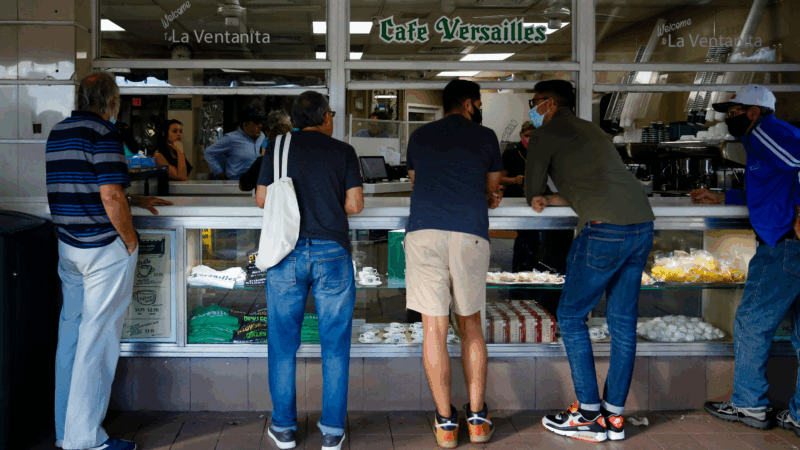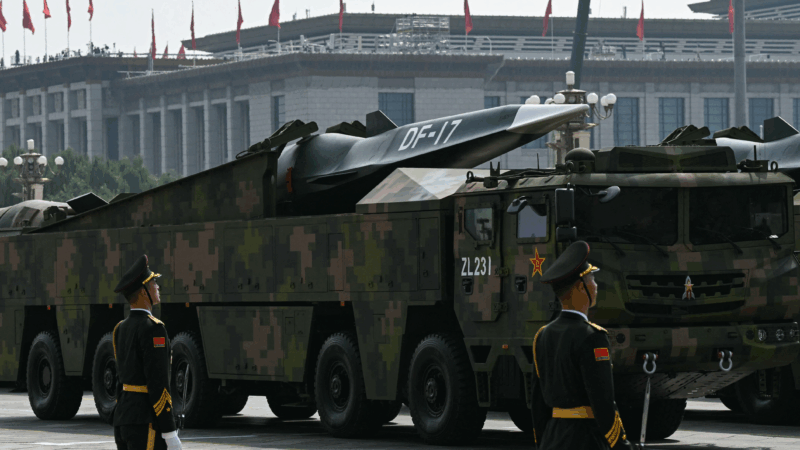In Miami, deportations are raising concerns among Cuban-Americans
In Florida, the growing number of immigrants being deported are raising concerns among some of President Trump’s most loyal voters: Cuban-Americans. Before last year’s election, more than two-thirds of Cuban-Americans in Miami-Dade County told pollsters they supported Trump. But the Trump administration’s recent actions on immigration are drawing criticism from Cuban-Americans and other Hispanics.
At a “ventanita,” a counter-service window at a restaurant in Miami’s Westchester neighborhood, customers gathered this week for Cuban coffee and conversation. Roger Schaefer, a second-generation Cuban-American calls himself “a Trump supporter 100%.” But he’s not comfortable with how the Trump administration is cracking down on people living here without legal status.
“I was on board with deporting any criminal, not so much people who come to work hard—roofers and construction guys. I’m not for deporting people without criminal records,” he said.
In Florida and around the country, Immigration and Customs Enforcement officers are detaining and beginning deportation proceedings against people with no criminal violations, in some cases arresting them at required routine check-ins with immigration authorities.
Those stories, which are being widely covered by Spanish and English-language media, are generating a lot of attention and talk in Miami-Dade County. It’s a place where nearly 7 out or 10 people are Hispanic and more than half of the residents came here from another country.
Jorge Pitta, whose parents came from Honduras and Uruguay, says he’s been following the stories and the debate closely.
“It’s rough because I’m Hispanic myself and I see my people being treated like this,” he says. “I’m in agreement with having to deport massively because a lot of illegals did come through. I just don’t like the way it’s being done.”
Like others at the ventanita, Pitta is critical of the protests in Los Angeles. He believes people are siding with immigrants who entered the country illegally over law enforcement authorities. But he’s not happy with the Trump administration’s approach.
“I voted for the guy because I like him,” he says. “I do think Trump also has his mistakes that he needs to address. Foreign policy is one. The way he’s handled this immigration is not good.”
Abel Delgado, who heads Miami-Dade County’s Democratic Hispanic Caucus, says the Trump administration has shocked the South Florida community by deporting people to countries run by authoritarian regimes.
“We didn’t deport people to Cuba on a regular basis before,” Delgado says. “That has changed. We didn’t think it was wise to send people back to Venezuela. Based on all the changes that President Trump is making, he must think that things are perfectly fine in Cuba and Venezuela.”
The concerns about deportations and policies such as the travel ban imposed on Haiti and the partial ban imposed on Cuba and Venezuela, may be denting Trump’s support among Hispanics in Florida, but many are doubtful it will have a lasting impact.
Ninoska Perez, a prominent Cuban-American talk show host in Miami says many who call into her daily radio show believe the immigration crackdown was overdue.
“I think President Trump has a mandate that was given to him is this election saying that he has to protect the borders. And this is one way to do it,” she says.
In the last week, some prominent Cuban-American elected officials have begun to express concerns about the administration’s actions. On social media, Florida Republican state senator Ileana Garcia posted a series of statements criticizing the Trump administration, singling out White House deputy chief of staff Stephen Miller, the architect of Trump’s immigration policy. Garcia, a long-time Trump supporter who founded Latinas for Trump called the deportations -quote- “unacceptable and inhumane.” She didn’t respond to interview requests.
Republican Congresswoman Maria Elvira Salazar, also from Miami, has expressed similar concerns about the crackdown, saying deportations of Cubans, Venezuelans and Nicaraguans have left her “heartbroken.” She says she and other Cuban-American members of Congress are meeting this week with Homeland Security Secretary Kristi Noem to discuss their concerns about people being deported to these countries.
U.S. unexpectedly adds 130,000 jobs in January after a weak 2025
U.S. employers added 130,000 jobs in January as the unemployment rate dipped to 4.3% from 4.4% in December. Annual revisions show that job growth last year was far weaker than initially reported.
Greetings from Mexico City’s iconic boulevard, where a dog on a bike steals the show
Every week, more than 100,000 people ride bikes, skates and rollerblades past some of the best-known parts of Mexico's capital. And sometimes their dogs join them too.
February may be short on days — but it boasts a long list of new books
The shortest month of the year is packed with highly anticipated new releases, including books from Michael Pollan, Tayari Jones and the late Nobel laureate Mario Vargas Llosa.
Shootings at school and home in British Columbia, Canada, leave 10 dead
A shooting at a school in British Columbia left seven people dead, while two more were found dead at a nearby home, authorities said. A woman who police believe to be the shooter also was killed.
Trump’s EPA plans to end a key climate pollution regulation
The Environmental Protection Agency is eliminating a Clean Air Act finding from 2009 that is the basis for much of the federal government's actions to rein in climate change.
The U.S. claims China is conducting secret nuclear tests. Here’s what that means
The allegations were leveled by U.S. officials late last week. Arms control experts worry that norms against nuclear testing are unraveling.







